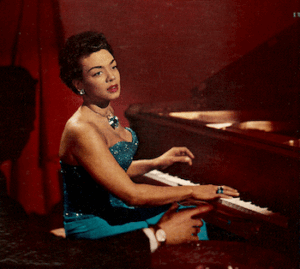Since time immemorial, history books on the world stage have erased, sidelined, and belittled the great contributions of the womenfolk to world advancement, thankfully, however, many thanks movements like #BlackHistoryMonth the black legacy is rightfully been cemented through its rightful dictates.
Today in honor of #BlackHistoryMonth we salute an amazing woman who stood proudly in her own right, acclaimed singer, actress, and activist Hazel Dorothy Scott!
Even though it’s been decades since Trinidad-born American acclaimed jazz classical entertainer Hazel Scott (June 11, 1920 – 2 October 1981) breath her last, her indelible legacy in the black community still shines ever so brightly. She bravely stood up to the House Un-American Activities Committee and the Hollywood studio machine, thereby shining spotlight on issues of racial injustice and civil rights.
Renowned for her timeless jazzy classical performances which effortlessly dazzled audiences in the United States and beyond, Scott more than carved her legacy as not only the first African American woman to host her own television show but also as an outspoken voice against racial discrimination and segregation, boldly refusing to be intimidated.
Born June 11, 1920, in Port of Spain, Trinidad, an only child of father, R. Thomas Scott, a West African scholar from England, and mother Alma Long Scott, a classically trained pianist and saxophonist, whom she singles out as her “single biggest influence”, owing to her musical background, she spotted her talent quite early and at age 13 kicked off her musical career joining her mother’s band and at age 15, she made her solo stage debut at the Roseland Ballroom in New York City.

Her early musical theatre appearances in New York included the Cotton Club Revue of 1938, Sing Out the News, and The Priorities of 1942.
It was many thanks to her 1939 performances at Café Society in Greenwich Village, that Scott’s career scaled heights. By 1945, she was already an international superstar. She would later delve into Hollywood where she had to combat racial structures, she lent her voice to demanding equal pay and due credit, her call began to break archaic structures, earning her respectable film roles. She ditched roles such as singing maid and also stood firm against unacceptable wardrobe choices, choosing her own outfits. In 1945 her film career came to an end. Some of her credits where she performed herself include notably I Dood It (MGM, 1943), Broadway Rhythm (MGM, 1944) with Lena Horne, in the otherwise all-white cast of The Heat’s On (Columbia, 1943).
Scott made her television acting debut in 1973, on the ABC daytime soap opera One Life to Live.
Outside movies, she was established as an outspoken voice against racism in music, notably was one of the first performers to refuse to play before segregated audiences, including the stipulation in all her contracts.
“Why would anyone come to hear me, a Negro,” she told Time Magazine, “and refuse to sit beside someone just like me?” When she had just been escorted from the city of Austin, Texas by Texas Rangers owing to her blunt refusal to perform when she discovered that black and white patrons were seated in separate areas.
In 1949, Scott brought a suit against the owners of a Pasco Washington restaurant when a waitress refused to serve Scott and her traveling companion, Mrs. Eunice Wolfe, because “they were Negroes.” Scott’s victory helped African Americans challenge racial discrimination in Spokane, sparking a civil rights movement.
In 1950, Hazel Scott became the first black American to host her own TV show, The Hazel Scott Show. She was also noted for playing TWO grand pianos at the same time in The Heat’s On, 1943, inspiring a new generation of entertainers including Alicia Keys.
Scott passed away from pancreatic cancer on October 2, 1981, she lives a legacy
as one of the best-known African-American entertainers of her generation to leverage her platform to stand against racism and fight for black inclusivity and rights.



